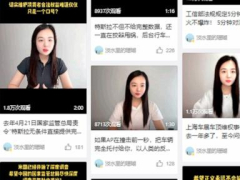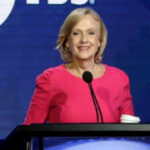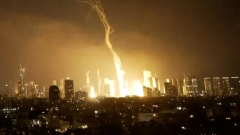BEIJING — Zhang Yazhou was sitting in the passenger seat of her Tesla Model 3 when she said she heard her father’s panicked voice: The brakes don’t work! Approaching a red light, her father swerved around two cars before plowing into an SUV and a sedan and crashing into a large concrete barrier.
Stunned, Zhang gazed at the deflating airbag in front of her. She could never have imagined what was to come: Tesla sued her for defamation for complaining publicly about the car’s brakes — and won. A Chinese court ordered Zhang to pay more than $23,000 in damages and publicly apologize to the $1.1 trillion company.
Zhang is not the only one to find herself in the crosshairs of Tesla, which is led by Elon Musk, among the richest men in the world and a self-described “ free speech absolutist.” Over the last four years, Tesla has sued at least six car owners in China who had sudden vehicle malfunctions, quality complaints or accidents they claimed were caused by mechanical failures.
The company has also sued at least six bloggers and two Chinese media outlets that wrote critically about the company, according to a review of public court documents and Chinese media reports by The Associated Press. Tesla won all eleven cases for which AP could determine the verdicts. Two judgments, including Zhang’s, are on appeal. One case was settled out of court.
It is not common practice for automakers — in China or elsewhere — to sue their customers. But Tesla has pioneered an aggressive legal strategy and leveraged the patronage of powerful leaders in China’s ruling Communist Party to silence critics, reap financial rewards and limit its accountability.
The AP review of Tesla’s record in China comes as Musk is wielding significant influence in President Donald Trump’s new administration, leading an effort to rapidly shrink the size of the federal government and oust employees deemed disloyal to the president. His actions have raised concerns that Musk is weakening the U.S. system of checks and balances, in part, to benefit Tesla and his other companies.
In the United States, Musk has found a powerful ally in Trump. Together, they have ransacked the federal government, freezing spending, suspending programs and dismissing prosecutors, government watchdogs and others that have traditionally acted as guardrails.
Tesla officials in China and the United States did not reply to requests for comment.
Tesla’s record in China shows how Musk has thrived in a system in which regulators, the media and the courts — which must all ultimately answer to the ruling Communist Party — are, by design, somewhat intertwined.
Tesla has profited from the largesse of the Chinese state, winning unprecedented regulatory benefits, below-market rate loans and large tax breaks. With a few pointed exceptions, Tesla has enjoyed largely ingratiating coverage in the Chinese press, and journalists told AP they have been instructed to avoid negative coverage of the automaker.
Tesla’s windfall has extended to the courts — and not just in legal actions Tesla has brought against customers. In a review of public court documents, AP found that Tesla won nearly 90% of civil cases over safety, quality or contract disputes brought by customers.
“The government gave Tesla a super status that put consumers in a very vulnerable position,” said Qiao Yudong, a former lawyer for American sports car company Saleen Automotive in China. “That’s why some consumers had to resort to extreme actions.”
One of those desperate customers was Zhang.
The February 2021 crash in central China’s Henan province sent Zhang’s mother and father, who had a concussion, to the hospital for four days, medical records show. Zhang — who was unharmed in the accident, as was her baby niece — wanted to understand what had happened: How could her dream car have turned into such a nightmare?
Traffic police determined that the crash was her dad’s fault because he hadn’t maintained a safe following distance. Zhang, however, insisted that the brakes had malfunctioned, sending the car out of control. She filed a complaint with a local market regulator, requesting a refund and compensation. Teslas are among the most computerized cars on the market, so Zhang asked the automaker to turn over the full pre-crash data from her car, hoping it might help explain what went wrong. Tesla refused.
“Tesla’s employees were very arrogant and tough in dealing with my complaints,” Zhang said in an interview. “I was burning with anger.”
After weeks of stewing, she draped her damaged car with a banner proclaiming “Tesla brake failure” in front of the Tesla dealership in Zhengzhou, the capital of Henan province, some 200 km (124 miles) from her home. She sat on the Tesla’s roof and blared her protest through a bullhorn: “Tesla Model 3 brakes failed,” she said. “A family of four almost died.” The next month, she parked her damaged car outside an auto show in Zhengzhou. It was all to no avail — Tesla refused to turn over the full data and mediation went nowhere.
Figuring that top Tesla officials would attend an April auto show in Shanghai, she and a friend — who had also had a problem with her Tesla — donned matching T-shirts with the phrase “Brakes fail” and headed for Tesla’s booth, determined to buttonhole executives. The automaker’s officials avoided them, Zhang said, and they couldn’t get anyone to hear them out.
Her friend, who was six months pregnant, started shouting, “Tesla brakes fail!”
Zhang clambered on top of a shiny red display model and started hollering, too.
“Things escalated,” said Zhang.
The moment — captured on cell phone videos shot by onlookers — went viral on Chinese social media. Burly security guards hauled Zhang out, and she was detained for five days.
Some observers speculated that Zhang’s protest had been orchestrated — perhaps by a competitor or by the Chinese government itself to pressure Tesla to conform with Chinese regulations. Tesla alleged that Zhang hadn’t acted on her own. A top executive speculated to Chinese media that she “had someone behind her” and said Zhang was making a fuss because she just wanted higher compensation.
Zhang insisted she acted on her own — and out of anguish. Outraged, she sued Tesla for defamation, arguing that the executive’s comments unjustly cast her as a troublemaker to deflect attention from the company’s own shortcomings.
And then she found herself on the receiving end of a lawsuit f





